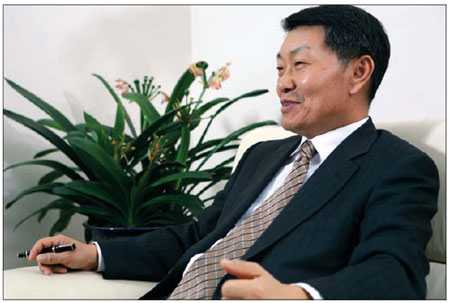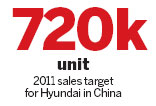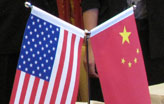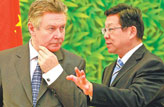Companies
Hyundai hikes image, portfolio and production
Updated: 2011-07-18 11:15
By Han Tianyang (China Daily)
BEIJING - South Korean automobile brand Hyundai has risen quickly over the past decade to distinguish itself globally, especially in the US market.
It has now transplanted that successful North American experience to the even more sizable Chinese market through its joint venture with Beijing Automobile Group.
 |
|
J. M. Noh, president of Beijing Hyundai [Photo/China Daily] |
The Sino-Korean partnership sold 700,000 vehicles in the country last year, about one-fifth of Hyundai's global total, making China the carmaker's largest single market worldwide, followed by South Korea and the US.
Strong sales continued in the first six months of this year, with 365,000 vehicles delivered, a 10.6 percent increase over the same period last year.
J. M. Noh, president of Beijing Hyundai, said the joint venture will have no problem reaching its 2011 sales target of 720,000 units.
The 62-year-old Korean has been working at Beijing Hyundai since it was established in 2002.
Dark horse
The joint venture has been a dark horse in the Chinese auto market, making only 50,000 vehicles in 2003, the year Beijing Hyundai began production.
With little fanfare, over the following eight years it built up production and a dealer network, selling 700,000 vehicles last year to rank No 4 among the nation's car companies.
Noh said the right products at the right time have been crucial to the company's accomplishments.
An example is the Elantra Yuedong launched in 2008. The compact tailored to local preferences sells only in China.
Noh said that after intensive discussions and evaluation with its Chinese partner and fine arts professors, the company decided the Yuedong would suit the local market.
Competitive pricing helped greatly in the model's success, Noh added.
 |
Noh explained that the company sets a price point whenever it develops a new model.
"Two years before we rolled out the Yuedong, we had an anticipation of its price in the market and according to that projection we controlled costs during the whole development process."
Beijing Hyundai continued to sell the older-generation Elantra in China after the Yuedong hit the market, which Noh believe is an effective way to broaden its customer base.
"The Chinese market is huge and customers have different demands - with both models on the market we can more efficiently meet the diverse requirements of car buyers," he said.
Combined sales of the Elantra and Elantra Yuedong hit 400,000 units last year, about 60 percent of Beijing Hyundai's total 2010 sales.
The two compacts sustained their popularity into this year with combined monthly sales of more than 30,000 units.
Noh predicts that for volume sales, the compact segment of China's auto market has the brightest future.
Beijing Hyundai's lineup also includes two SUVs. Combined monthly sales of the ix 35 and Tucson now range from 13,000 to 14,000 a month. Other products include small cars like the i 30, Verna and Accent, as well as the mid-sized Moinca and Sonata.

Specials

China-US Governors Forum
The first China-US Governors Forum is held July 15 in the Salt Lake City, the United States.

My China story
Foreign readers are invited to share your China stories.

Rare earths export quota
China kept its export quota at almost the same level as last year.